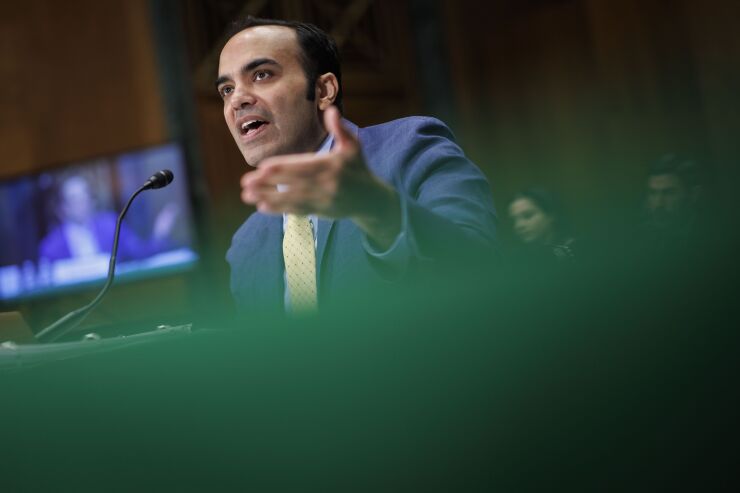
WASHINGTON — The Consumer Financial Protection Bureau said it will pursue a larger participant rule in the personal loan market, more than two years after a trade group and consumer advocates petitioned the bureau for one.
Although it's an infrequently used tool, trade groups, advocates and even individuals have the ability to petition federal agencies to pursue rulemakings. In September 2022, the Consumer Bankers Association and the Center for Responsible Lending asked the CFPB to start regulating larger fintech lenders that make installment and other kinds of personal loans.
"Although our views on consumer financial regulatory issues often diverge, CRL and CBA share a common belief that the absence of a rule defining larger participants in the market for personal loans has created an un-level playing field and a large risk to consumers that the Bureau can and should resolve through a larger participant rulemaking," the two groups said in a letter to the agency.
The bureau on Wednesday said that it will pursue a rulemaking along those lines.
"Your concerns about the existence of an un-level playing field in the market for personal loans have merit," the CFBP said in its response to the petition. "In particular, banks that offer credit cards and nonbanks that offer payday loans (including traditional payday loans or online or app-based payday loans that are sometimes marketed as 'earned wage' products) are subject to CFPB supervision, while other nonbanks in the personal loan market (e.g., Buy-Now-Pay-Later and installment lenders) generally are not."
Two trade groups filed a lawsuit against the Consumer Financial Protection Bureau claiming it exceeded its authority and ignored the legislative history on medical debts.
The CFPB also responded to a petition from Aaron Klein, senior fellow in economic studies at the Brookings Institution, agreeing to participate in a joint rulemaking with the Federal Reserve Board to update regulations around reducing the time periods for holds on most checks and ATM deposits.
"The analysis required by the statute takes due account of the interest of depository institutions in receiving payment," the CFPB said in response to the petition. "The Director recognizes that there can be complex issues related to check fraud to consider. If the analysis shows that the hold times for checks and ATM deposits can be reduced under the applicable standard, then by statute, they must be. Checks and ATM deposits continue to be relied upon by millions of consumers and small businesses, and it is essential to carry out Congress' mandate to keep hold times up to date."
The bureau said that issues in the petition would require buy-in from the Federal Reserve, and that the CFPB would participate in a rulemaking if the Fed would join in.
The responses to both petitions comes as control in Washington is changing hands. While Rohit Chopra is currently the director of the CFPB, incoming President Donald Trump has the ability to replace him upon taking office on Jan. 20.
"We appreciate the CFPB's response to our petition on this important issue, though we note that current leadership has less than two weeks at the helm," said a CBA spokesperson in a statement. "We look forward to working with the new Administration's CFPB, which will need to work through a range of important priorities in ensuring that all consumers receive the high level of protections they deserve, regardless of where they go to meet their financial needs."






